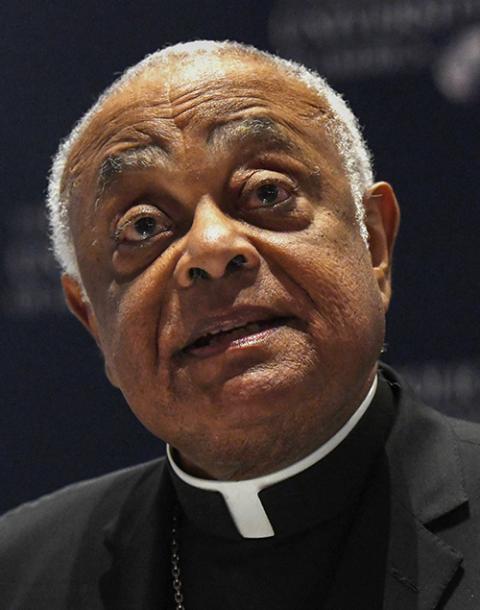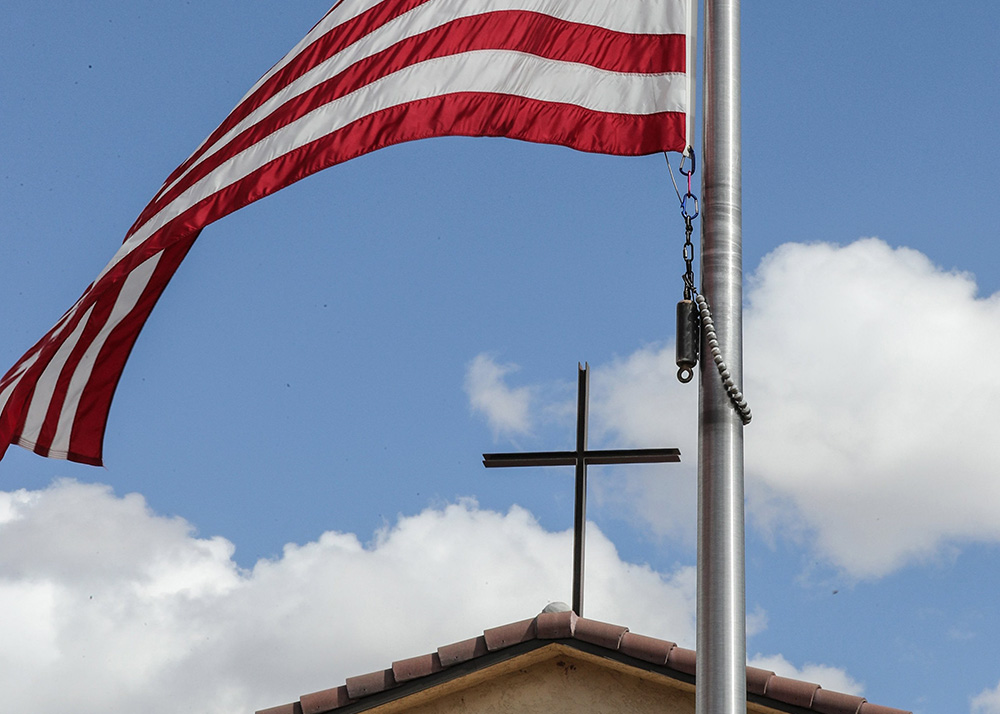
An American flag frames a cross atop Immaculate Conception Catholic Church in Cottonwood, Ariz., Oct. 29. The parish hall of the church is a polling station for voters in the Nov. 5 election. Arizona is one of seven battleground states this year. (OSV News/Bob Roller)
A historic and tumultuous election cycle is nearing its end.
Catholic bishops in the United States mostly have tempered their remarks about the presidential contest between Vice President Kamala Harris and former President Donald Trump, in an election that has witnessed a sitting president bowing out of a second-term bid, assassination attempts, warnings for democracy's future, and specters of post-election violence.
The U.S. Conference of Catholic Bishops has mostly focused on its voting guide, "Forming Consciences for Faithful Citizenship." The conference and dioceses cannot endorse candidates due to their tax-exempt status, and bishops largely refrain from directly telling Catholics how to vote.
But the multiple historical developments surrounding the 2024 presidential election, including fears for the future of democracy, has made the bishops' low profile all the more notable, said Massimo Faggioli, a professor of theology and religious studies at Villanova University.
"I think there's a sense that it's a very delicate moment and they know that the Catholic voters are very divided. ... So they don't want to look political. They don't want to contribute to the anxiety," he said. "The question is, in my mind, what's at stake in this election is not just political, but it is constitutional and this is something that is different."
More than 75% of likely voters believe that American democracy is currently under threat, according to an October poll by Siena College and The New York Times. One in five pin that threat to Trump and six in 10 are not confident he will accept the results.
The only U.S. president to be twice impeached, Trump has been indicted in state and federal court for his role in attempting to overturn the results of the 2020 election and the Jan. 6, 2021, insurrection at the U.S. Capitol. The outcome of the election could determine if he will stand trial on those charges.
Advertisement
Past officials have warned what a second Trump term may hold, with former chief of staff Gen. John Kelly saying that Trump meets the definition of a fascist.
"This is not a normal election," Faggioli said, "and so it's an election where, I think, many people feel that democracy is at stake. And it would be interesting to see the U.S. bishops saying something on the importance of democracy, of the rule of law."
Meghan Clark, a moral theologian at St. John's University in New York, called the bishops' approach to the election "inadequate to the moment that we are living in."
The Catholic clergy's influence on voters in their flock appears limited.
An October poll by National Catholic Reporter of Catholics in seven swing states found that 32% said that bishops were somewhat or very influential on their vote; 68% said bishops had little or no influence. In contrast, about six in 10 named Jesus or family and friends as what most influences their decisions, while about half cited the Bible.
Overall, in the poll Catholics in the battleground states supported Trump over Harris, 50% to 45%.
From the cardinals
Cardinal Wilton Gregory, head of the archdiocese that encompasses the White House, acknowledged in a column a sentiment that many share: "This has been a long political season."
"It's understandable if one may sometimes feel inundated, hesitant, discouraged or simply fed up with the political process. But the truth is we cannot simply sidestep civic affairs. Voting is not only a privilege; it is a sacred responsibility that we shoulder for the direction of our community, state and nation," the archbishop of Washington wrote in an Oct. 3 column.
Gregory did not mention Harris or Trump, or the presidential contest at all. He called the dignity of human life "a foundational issue" among numerous "vitally important concerns" like the economy, housing, immigration and the environment.
"Every election places before us serious choices. What defines us as a people is, in no small way, how we respond. When a voter once asked him for advice during an election with particularly difficult options, Pope Francis responded, 'Study the proposals well, pray, and choose in conscience!' " Gregory wrote.
Francis has repeatedly advised against single-issue voting, a contrast with the U.S. bishops' conference, which has stated abortion remains its "preeminent priority."
Asked by reporters how Catholics should decide between Trump, given his mass deportation pledge, and Harris, who supports abortion rights, the pope replied: "One must choose the lesser of two evils. Who is the lesser of two evils? That lady or that gentleman? I don't know."
In New York, Cardinal Timothy Dolan offered election reflections in his homily Sunday, saying "If we place total confidence in any candidate other than the Lord, sooner or later, we'll be disappointed."
Two weeks earlier, Dolan sat next to Trump at the annual Al Smith Dinner; Harris sent a video. Criticized for complimentary remarks he made to Trump in 2020, the New York cardinal has said this year: "Neither of these candidates really can encapsulate the Catholic culture of life."
In an Oct. 29 episode of his podcast, Dolan praised Puerto Rico Archbishop Roberto González and Los Angeles Archbishop José Gomez for calling out the Trump campaign after a comedian called Puerto Rico "a floating island of garbage" at a Trump rally in Madison Square Garden.
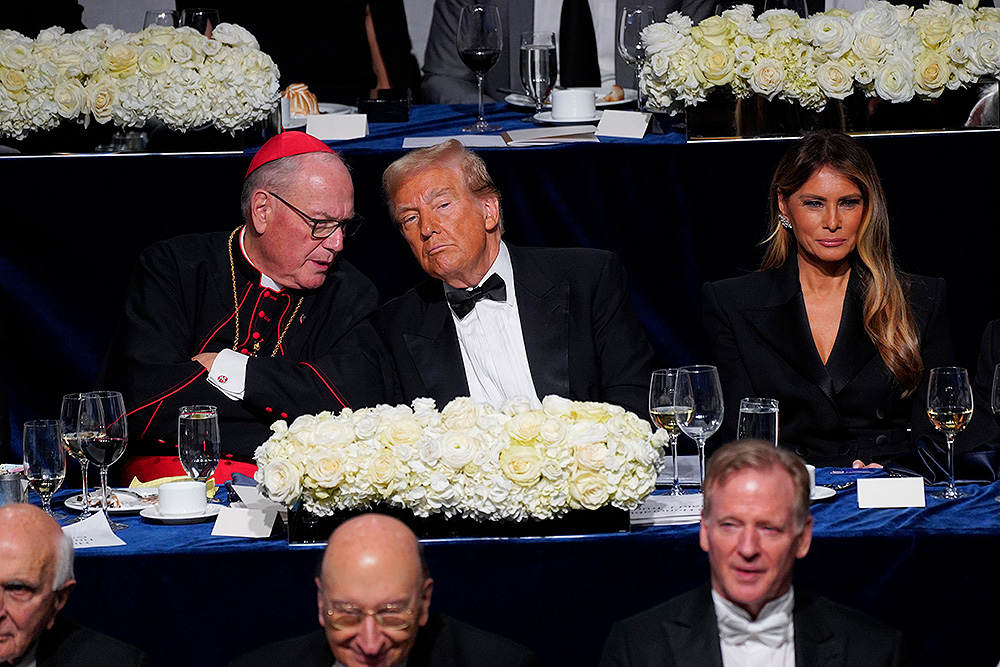
New York Cardinal Timothy Dolan chats with former President Donald Trump during the Alfred E. Smith Memorial Foundation Dinner in New York City Oct. 17. Also pictured is Trump's wife, Melania. (OSV News/Gregory A. Shemitz)
Clark said that racist remarks from the Trump campaign, toward Puerto Ricans as well as Haitian immigrants, presented bishops an opportunity to speak in a unified voice calling for lies about immigrants to stop and demanding an apology.
"Very few bishops have shown the moral courage to stand up on behalf of those being demonized," she said.
The San Diego Diocese framed the presidential contest as presenting "starkly competing visions for the future of the nation." It linked back to a lengthy essay that Cardinal Robert McElroy penned ahead of the 2020 election, where he advised evaluating a candidate's leadership, competence and character.
Both Cardinal Joseph Tobin of Newark, New Jersey, and Cardinal Blase Cupich of Chicago wrote summer reflections on the importance of voting.
Cupich warned against groups "pretending to speak on behalf of all Catholics by offering a very narrow version of our teachings, often reducing it for their own partisan aims."
"It is up to each of us as Catholics to be informed about the issues, reflect on them through the prism of all that our faith teaches us, become involved in the political process and vote. If there is a Catholic vote, it must remain in the hands of each Catholic to decide in good conscience," Cupich said.
In an article-length post Oct. 22 on the social media platform X, Cardinal Raymond Burke called the present state of national politics "morally disgusting."
"Sadly, in our great nation, we confront a situation in which both major political parties espouse certain agenda which are flagrantly contrary to the most fundamental tenets of the moral law," said Burke, former prefect of the Apostolic Signatura at the Vatican and former archbishop of St. Louis.
In the battlegrounds
In Pennsylvania — seen as a linchpin in deciding the election — the bishops of Philadelphia and Pittsburgh both issued brief statements mainly encouraging Catholics to pray and vote.
"Our great nation and its people have faced daunting challenges in recent years. It's imperative that we make our voices heard on Election Day," Philadelphia Archbishop Nelson Pérez said.
The Pennsylvania Catholic Conference created a chart comparing Harris and Trump on 13 issues. Among them: abortion, criminal justice reform, the death penalty, environment, health care and immigration.
In Michigan, Detroit Archbishop Allen Vigneron dedicated a near-hourlong podcast episode to the election.
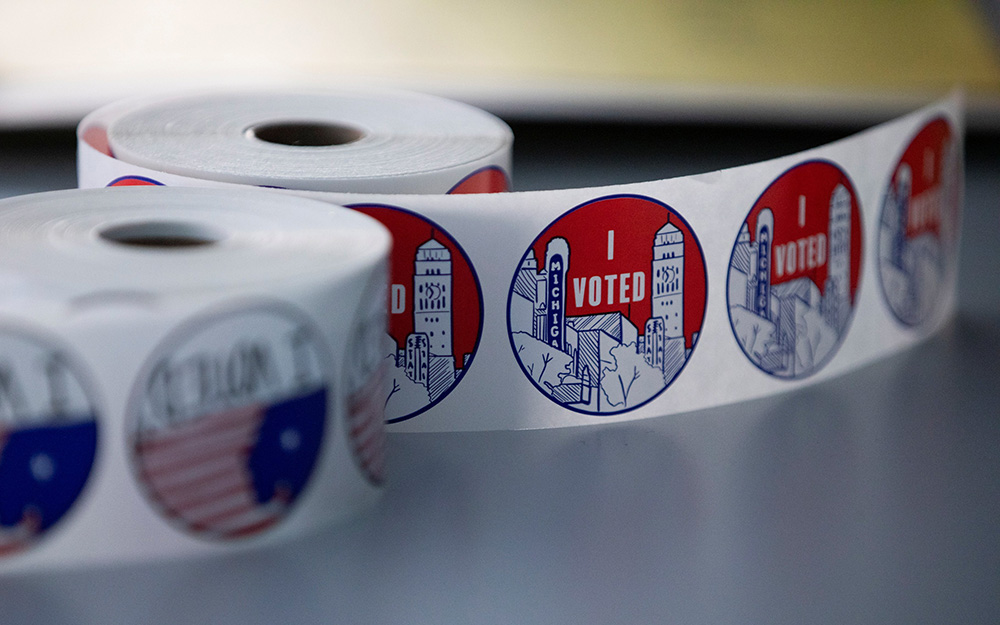
Michigan "I Voted" stickers are seen in Ann Arbor in 2020. (OSV News/Reuters/Emily Elconin)
Vigneron reiterated the U.S. bishops' conference position in "Faithful Citizenship," "that abortion is the preeminent issue to keep in mind as we determine the future of our country. Because the right to life is the basic right."
Bishops in Arizona, Nevada, North Carolina and Georgia have been mostly muted on the election, with attention mostly on state ballot measures. The Phoenix Diocese has partnered with other Christian denominations to hold prayer services for peace during the election season.
In a March letter, the bishops of Wisconsin advised Catholics to approach the election in the same way as the good Samaritan, "who in mercy encountered, accompanied, and helped heal a stranger. He did so by ignoring divisiveness, anger, fear, and misinformation."
They, too, repeated the stance that abortion remains the U.S. bishops' preeminent priority, and also called on Catholics to be peacemakers.
In a series of video messages, Green Bay Bishop David Ricken said that division and hatred are rising in the U.S., but "violence is never justified for whatever reason, political or otherwise."
"Let us pray for unity and civility as we all exercise our right and responsibility to vote," he said.
Elsewhere around the country
Outside the seven battleground states, other U.S. bishops have weighed in on the election.
Speaking Sunday at Yale University about "Faithful Citizenship," Archbishop Timothy Broglio, president of the U.S. bishops' conference, warned against a patriotism "distorted by a blind nationalism."
"We have to make a distinction between authentic patriotism, love of our country, and then a nationalism that might lead us to exclude some of the virtues and some of the teaching of the church," said Broglio, archbishop for Military Services.
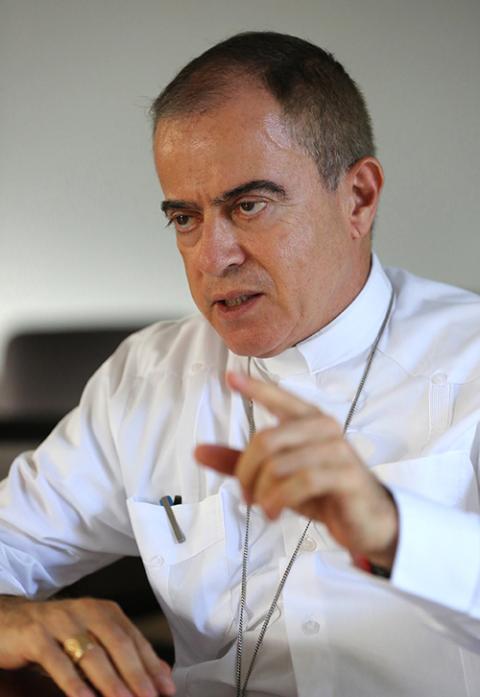
Archbishop Roberto González of San Juan, Puerto Rico (OSV News/Bob Roller)
On X, Bishop Joseph Strickland, who was bishop of Tyler, Texas, until Francis removed him in 2023, reshared a sermon from a priest who said that practicing Catholics cannot be part of the current Democratic Party. In a later post, he said "We must unseat the party that has propped up this puppet for 4 years," referring to President Joe Biden in a video addressing the Puerto Rico "floating island of garbage" remark.
González, the Puerto Rican archbishop, issued a letter condemning the comment made at the Trump rally at Madison Square Garden Oct. 27, and called on Trump to personally apologize, writing it is "not sufficient for your campaign to apologize."
Trump has not apologized, and later appeared in a garbage truck at a campaign stop.
Earlier in the month, Bishop John Stowe of Lexington, Kentucky, warned against the rising threat of Christian nationalism in a speech at the annual assembly of the Kentucky Council of Churches. The Franciscan bishop quoted from Project 2025, billed as a blueprint for a second Trump term created by the Heritage Foundation and former Trump officials and allies.
"Only one political party in the United States has put forth a candidate who endorses, embraces and spouts the language of Christian nationalism," said Stowe, adding others in the church were "walking on eggshells" to avoid partisan politics.
Faggioli, the Villanova historian, said bishops in other countries have spoken out when threats to democracy and the peaceful transition of power emerge. Some Catholics expected the January 2021 assault on the Capitol to lead the U.S. bishops to do the same, which he said could have happened early in the election season without coming across as partisan.
The lack of a unified statement to that effect, Faggioli said, is "something that will be remembered in history. And it's hard to see this as a prophetic church."
"There were certain ways or certain gestures that could have been done," he said, for the bishops to send a signal that "they believe that the constitutional system, that our democratic system, is worth defending."

